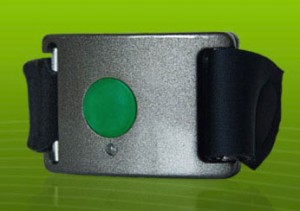
Similar device: Affectiva's Q Sensor
The promise of some wireless-enabled remote patient monitoring devices is that they can help prevent heart failure episodes. They aim to reduce hospital readmissions. A new device currently being developed by a team of academics here in Massachusetts aims to do the same thing for drug addiction relapses. After 30 days in a substance abuse clinic, can a remote monitoring device help patients once they re-enter the real world? The iHeal device aims to do just that.
A team of researchers at the University of Massachusetts Medical School has developed a prototype of a mobile health device that can detect changes in the affective state in an effort to predict when the wearer is about to "transition to risky behaviors," according to an abstract published in Springer’s Journal of Medical Toxicology this week. Edward Boyer and his colleagues have designed the device for individuals who have a post-traumatic stress disorder (PSTD) or a history of substance abuse.
The iHeal device is a wrist-worn sensor device that measures electrical activity of the skin, body motion, skin temperature, and heart rate. These are all indicators of arousal or stress that can be wireless streamed to a smartphone where an app can monitor and process the indicators. When stress levels reach a certain threshold, the app asks users to make a note about the events that led up to the increased stress levels, including information about perceived level of stress, drug cravings, and any other current activities. The opportunity is to deliver personalized, multimedia drug prevention interventions right at the critical moment.
iHeal sounds similar to the $2,000 Q Sensor device from Affectiva. Affectiva was founded in 2009 by two MIT scientists and started as a research project on autism at MIT’s Media Lab. The Q Sensor is a wearable wireless biosensor that measures emotional arousal (excitement, anxiety, and calm) via skin conductance, as well as temperature and movement.
The iHeal researchers believe their technology could also be used for managing chronic pain, overeating, medication adherence, too. Interventions for drug abuse and these other conditions are often ineffective outside of the clinic.
Future versions of iHeal device may be worn around the ankle or it could look more like a wristwatch.
The researchers conclude: “Our findings demonstrate that conducting clinical trials using enabling technologies in natural environments will require a deeper understanding of user preferences. Study designers should rely on recipients rather than ‘experts’ to create intervention content. A focus on preventing identification of research participants to avoid subsequent stigmatization is also key.”
More over at Springer's website here.












